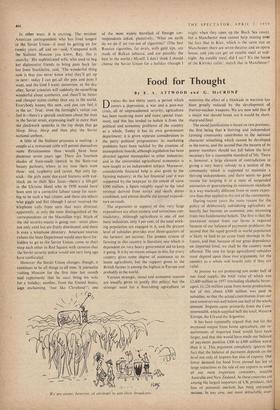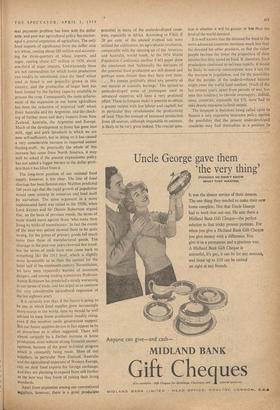Food for Thought
By E. A. ATTWOOD
DLIKING the last thirty years, a period which covers a depression, a war and a post-war Crisis, all of unprecedented severity, agriculture has been receiving more and more special treat- ment, and this has tended to isolate it from the political and economic problems of the country as a whole. Today it has its own government department; it is given separate consideration in the party political programmes; its marketing problems have been tackled by the creation of Monopolistic boards, although legislation has been directed against monopolies in other industries; and in the universities agricultural economics is now taught as an independent subject. Moreover, considerable financial help is also given to the farming industry; in the last financial year it was supported by.the taxpayer to the extent of some £300 million, a figure roughly equal to the total revenue derived from surtax and death duties combined, and almost double the annual expendi- ture on roads.
The arguments in support of this very large expenditure are often esoteric and sometimes con- tradictory. Although agriculture is one of our basic industries, only 4 per cent. of the total work- ing population are engaged in it, and the present level of subsidies provides over three-quarters of the farmers' net income. The present system of farming in this country is therefore one which is dependent on very heavy government aid to keep it going. It is by no means unique in this, for every country gives some degree of, assistance to its home agriculture, but the support given to the British farmer is among the highest in Europe and probably in the world.
Various strategic, social and economic reasons are usually given to justify this policy; but the strategic need for a flourishing agriculture to
andit G. MeCRONE
minimise the effect of a blockade in wartime has been greatly reduced by the development of thermO-nuclear weapons. We are now told that if a major war should break out it would be short, sharp and final. •
The social justification is based on two premises. the first being that a thriving and independent farming community contributes to the national character, ,something which cannot be developed in the towns, and the second that the income of its poorer members should not fall below the level necessary for a reasonable standard of life. There is, however, a large .element of contradiction in giying a very heavy subsidy to a section of the. community which is supposed to maintain a thriving independence, and there seems no good reason for keeping it in a state of suspended animation or guaranteeing its minimum standards in a way markedly different from or more expen- sive than that applied to the rest of the community.
• During recent years the main reason for the policy of deliberately subsidising agriculture so heavily has become an economic one, stemming from two fundamental beliefs. The first is that the maximum output from our farms is required because of our balance of payments problems: the second that the rapid growth in world population is' likely to lead to an acute food shortage in the future, and that, because of our great dependence on imported food, we shall be the country most affected. The case for large agricultural subsidies must depend upon these two'arguments, for the country as a whole will benefit only if they are valid.
At present 'we are producing just under half of our food supply, the total value of which was £2,600 million in 1957 (excluding alcoholic bever- ages). il,:;26 million came from home production, but of this about £300 million was paid in subsidies, so that the actual contribution froM our own resources was well below one half of the whole amount. Imports came primarily from the Com- monwealth, which supplied half the total, Western Europe, the US and the Argentine.
It has been repeatedly argued that, but for the increased output' from home agriculture, our re- quirements of imported food would have been larger, and that this would have made our balance of payments position £300 to MO million worse than it is. This argument completely ignores the fact that the balance of payments depends on the level not only of imports but also of exports. Our F lower demand. for food from abroad has led to large reductions in the sale of our exports to some of our most important customers, 'notably Australia and New Zealand. As these countries are among the largest importers of UK products. this loss of potential markets has been extremely. serious. In any case, our most intractable over' seas payments problem has been with the dollar area, and post-war agricultural policy has.encour- aged a general expansion of agriculture. The only food imports of significance from the dollar area are wheat, costing about £80 million and account- ing for three-quarters of wheat imports, and sugar, costing about £27 million in 1958, about one-third of sugar imports. Unfortunately these are not commodities for which home production can readily be substituted, since the 'hard' wheat used in bread is not generally grown. in this country, and the production of sugar beet has been limited by the factory capacity available to process the crop. Consequently the main achieve- ment of the expansion in our home agriculture has been the reduction of imported 'soft' wheat from Australia and the Argentine, and the check- ing of further meat and dairy imports from New Zealand, Australia, the Argentine and Europe. Much of the development at home has gone into milk, eggs and pork (products in which we are now self-sufficient), but in doing so it has caused a very considerable increase in imported animal 'feeding-stuffs. As practically the whole of this increase has come from North America, it may well be asked if the present expansionist policy has not added a bigger burden to the dollar prob- lem than it has lifted from it.
The long-term position of our national food supply, however, is less clear. The fear of food shortage has been famous since Malthus predicted 160 years ago that the rapid growth of population would soon outstrip its resources and limit itself by starvation. The same argument ih a more Sophisticated forni was raised in the 1920s, when Lord. Keynes and Sir Dennis Robertson argued that, on the basis of previous trends, the terms of trade would move against those 'who make their living by tricks of manufacture.' In fact the events of the inter-war period showed them to be quite Wrong, for the prices of primary goods fell much more than those of manufactured goods. The shortage in the post-war years reversed this trend; but the terms of trade have now come back to something like the 1913 level, which is slightly more favourable to us than the normal for the latter half of the nineteenth century. Nevertheless, we have been repeatedly warned of imminent dangers, and among leading economists Professor Austin Robinson has predicted a steady worsening in our terms of trade, and has urged us to continue the very considerable agricultural expansion of the last eighteen years.
It is certainly true that, if the future is going to be one in which food supplies grow increasingly more scarce in the world, then, we should be well advised to keep home Production steadily rising, even if this involves costly government support. But our future supplies do not in fact appear to be as precarious as is often suggested. There will almost certainly be 'a further increase in home production, even without strong financial encour- agement, because of the great technical progress which is constantly being made. Most of our suppliers, in particular New Zealand, Australia and the agricultural exporters of Western Europe, rely on their food exports for foreign exchange; and they are planning to expand them still further as the best way they know of raising their living standards.
Apart from expansion among our conventional suppliers, however, there is a great productive potential in many of the underdeveloped coun- tries, especially in Africa. According to FAO, if 20 per cent. of the unused tropical soil were utilised for cultivation, an agricultural revolution, comparable with the opening-up of the Americas and Australia. would result. At the 1954 World Population Conferenice another FAO paper drew the conclusion that 'technically the horizons of the potential food production arc still distant and perhaps more distant than they have ever been. . . . We cannot, justifiably plead any poverty of our natural or scientific heritage.' The spread to underdeveloped areas of techniques used in advanced countries will have a very profound effect. These techniques make it possible to obtain a greater output with less labour and capitali but in particular they revolutionise the productivity of land. Thus the amount of increased production from all sources, although impossible to estimate, is likely to be very great indeed. The crucial ques-
tion is whether it will be greater or less than the level of the world demand.
It is well known that the demand for food in the more advanced countries increases much less than the demand for other products, so that the richer people become' the lower the proportion Of their income that they spend on food. lf, therefore, food production continued to increase rapidly, it Would be likely to outstrip consumption were it not for the increase in population, and for the possibility that the peoples of the underdeveloped nations might enter the world food markets. Much of the `last seventy years, apart from periods of war, has seen this tendency to chronic oversupply; indeed, some countries,' especially the US, have had to take drastie measures to limit output.
The taxpayer is therefore being called upon to finance a very expensive insurance policy againS1 the possibility that the present underdeveloped countries may find themselves in a position to bid us out of the world food markets and cause a World food shortage. The risk that this may hap- pen is nowhere near as great as is often sup- posed, for these countries show little sign of producing an exportable surplus with which to pay for large-scale food imports. In fact, they still have great opportunities for increasing their own agricultural output and in most cases this is the prerequisite of their industrial development. It therefore seems likely that most of the food they will consume as their national incomes rise will come from their own land.
The premium we are paying to our agriculture is very largely to insure us against a risk which has been magnified out of all proportion. The tales of woe which accompany the figures of increase in the total human population are care-
fully worded to avoid mentioning the fact thaf total food production has been rising at an even faster rate, and that we are therefore unlikely to find ourselves in a world unable to provide food for those in a position to pay for it.
On all grounds, therefore, the economic justifi- cation for the continued high level of agricultural support is slender, yet food is a commodity so essential to human existence that governments are naturally wary of taking risks. The answer is probably to try gradually to make British agri- culture more competitive, to discourage the less economic units and to seek eventually to reduce the burden of price support. This would make British agriculture very much more eflicient and in the long run more healthy; but at all costs the idea of preserving it in a vacuum must be avoided.




































 Previous page
Previous page